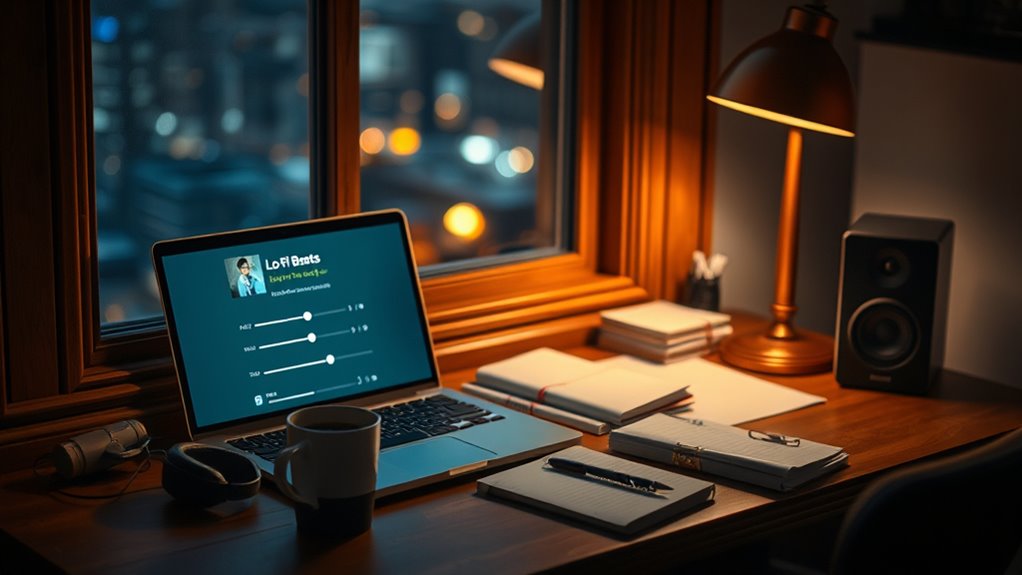Lo‑Fi beats can boost your focus by providing soothing background sounds that are familiar and calming, which helps reduce stress and enhance concentration. Their steady rhythms and mellow melodies engage your brain without being distracting. While some effects are genuine, like relaxation and improved mood, a placebo effect from comfort and nostalgia also plays a role. To find out how much of it is science and how much is perception, keep exploring this interesting topic.
Key Takeaways
- Lo-fi music’s steady rhythms and calming melodies can enhance focus and cognitive performance during study sessions.
- Its nostalgic and familiar elements may reduce stress and emotional distraction, promoting sustained concentration.
- Scientific research indicates that music therapy, including lo-fi, can relax the brain and improve attention, suggesting genuine benefits.
- Personal preferences and subjective experiences influence whether lo-fi acts as a true productivity aid or a placebo effect.
- Compared to other background noises, lo-fi often provides a balanced, non-intrusive environment that supports focus without fatigue.
The Appeal of Lo‑Fi: Why It Works for Some

Many people find that Lo-Fi beats create the perfect background for studying because they are soothing without being distracting. This appeal often comes down to personal music preferences, as many listeners enjoy the mellow, repetitive nature of Lo-Fi. It helps regulate mood by calming nerves and reducing anxiety, making it easier to focus. You might notice that these beats subtly influence your emotional state, creating a sense of comfort and stability. Unlike more energetic or complex music, Lo-Fi provides just enough stimulation to stay engaged without overwhelming your senses. This balance makes it an effective tool for maintaining concentration, especially if you’re someone who appreciates a relaxed, steady rhythm to support your productivity. Additionally, sound quality plays a significant role in how effective Lo-Fi beats are for focus, as clear and well-balanced audio can enhance the calming effect.
Scientific Insights Into Music and Focus

Scientific research shows that music can considerably influence your ability to concentrate by affecting brain activity and emotional states. Studies in music therapy demonstrate that certain types of music, including lo-fi beats, can promote relaxation and reduce stress, creating an *ideal* environment for focus. Music’s impact on cognitive enhancement is well-documented; it can improve memory, attention, and problem-solving skills. When you listen to calming, rhythmic music, your brain engages in neural processes that support sustained attention. This aligns with efficiency ratings that indicate how well a system performs, demonstrating that selecting the right music can optimize mental performance. This is why many find music therapy effective for sharpening mental clarity. While individual responses vary, the evidence suggests that carefully chosen music can serve as a tool to boost concentration, making it more than just background noise—it’s a scientifically supported aid for productivity.
The Role of Nostalgia and Comfort in Concentration

Nostalgia and feelings of comfort can considerably enhance your ability to concentrate, especially when listening to music like lo-fi beats. Retro comfort, rooted in familiar melodies or vintage sounds, creates a sense of emotional grounding that calms your mind. When you hear these nostalgic elements, your brain associates the music with positive memories, reducing stress and distracting thoughts. This emotional grounding helps you feel more centered, making it easier to focus on your tasks. The familiar, cozy atmosphere of lo-fi beats taps into your desire for comfort, providing a soothing backdrop that fosters concentration. By evoking nostalgia, these beats transform your workspace into a safe, comforting environment, allowing you to stay engaged longer and work more efficiently. Additionally, the calming effects of consistent, smooth sounds are similar to the benefits seen with certain airless paint sprayers, which provide even coverage and reduce fatigue during extensive projects, ultimately supporting sustained focus.
Comparing Lo‑Fi to Other Background Noises

Lo-fi beats stand out among various background noises because of their unique blend of mellow melodies and steady rhythms that promote focus. Compared to other ambient noise options, such as white noise, nature sounds, or city sounds, lo-fi offers a balanced auditory environment that minimizes distraction without overwhelming. To understand their effectiveness, consider these points:
- Ambient noise varies from calming to chaotic, impacting cognitive enhancement differently.
- White noise provides consistent sound but can sometimes feel monotonous or intrusive.
- Nature sounds evoke relaxation but may evoke strong imagery, distracting some learners.
While all can aid concentration, lo-fi’s mellow, rhythmic qualities tend to foster sustained focus without fatigue, making it a preferred background choice for cognitive enhancement.
Personal Experiences and Subjective Effects

Many people find that listening to lo-fi beats enhances their focus and makes study sessions feel more enjoyable. Your personal music preference plays a significant role in this experience; if you enjoy the genre, you’re more likely to feel motivated and engaged. The emotional response triggered by the beats also impacts your concentration—calming melodies can reduce stress, while upbeat rhythms might boost energy. Some individuals report that lo-fi helps them relax and enter a productive flow state, while others feel it’s merely a placebo. Your subjective effects vary based on mood, environment, and listening habits. Ultimately, personal experiences with lo-fi are deeply individual, shaping whether you see it as a genuine aid or just background noise.
Frequently Asked Questions
Can Lo‑Fi Beats Improve Memory Retention During Studying?
You wonder if music can boost memory retention while studying. Lo‑Fi beats, with their relaxed tempo and simple sound quality, might help create a calming environment that reduces distractions. The steady music tempo can improve focus, making it easier to absorb information. While scientific evidence varies, many find that the sound quality and consistent rhythm of lo‑fi beats support sustained attention, potentially enhancing your memory retention during study sessions.
Are There Specific Genres Within Lo‑Fi That Are More Effective?
When considering if certain lo-fi genres are more effective, you notice genre variation and artist influence matter. You might find that mellow, instrumental beats help you focus better, while more upbeat styles could boost your energy. Personal preference plays a role, so experimenting with different genres lets you discover what enhances your concentration. Ultimately, selecting music that resonates with your mood and task can improve your study sessions.
How Does Individual Personality Influence Lo‑Fi’s Effectiveness?
Your personality traits and learning styles shape how effectively you respond to lo‑fi beats. If you’re highly sensitive or thrive on calm, these beats might feel like a secret weapon, supercharging your focus. Conversely, if you’re easily distracted by background noise, they could be a distraction. Your unique personality influences whether lo‑fi helps you immerse yourself in deep concentration or simply becomes pleasant background music, making it essential to tailor your study environment accordingly.
Does Lo‑Fi Have Long-Term Cognitive Benefits or Just Immediate Focus?
You wonder if lo-fi beats offer long-term cognitive benefits or just boost immediate focus. While they may enhance sustained concentration temporarily, some research suggests they could support neuroplasticity enhancement over time, helping your brain adapt and improve. However, evidence remains limited, so it’s likely that listening to lo-fi provides short-term focus benefits with potential long-term gains if combined with other cognitive exercises.
Can Listening to Lo‑Fi Replace Other Focus-Enhancing Strategies?
You might wonder if listening to lo-fi can replace other focus strategies. While it can help reduce music fatigue and minimize distraction potential, relying solely on lo-fi isn’t ideal. It’s best to combine it with techniques like breaks and organized work periods. This way, you can enhance your focus without risking burnout or losing productivity due to overexposure or distraction. Use it as a helpful supplement, not a full replacement.
Conclusion
Ultimately, whether lo‑fi beats boost your focus or just offer a comforting backdrop, it’s all about finding what works for you. Remember, “beauty is in the eye of the beholder”—if these tunes help you concentrate, then enjoy them without overthinking. Sometimes, a simple melody can turn a tough study session into a more pleasant experience. Trust your instincts, and let the music be your ally in productivity.









